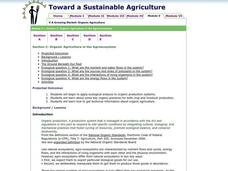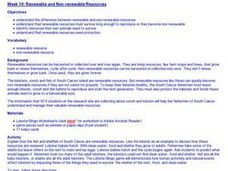Curated OER
A New Candidate for Animal Farm
Students create an advertising campaign in which a candidate from Animal Farm will run for an upcoming election. In this follow-up activity to George Orwell's Animal Farm lesson, students explore propaganda, rhetoric, and satire as they...
ESL Kid Stuff
Places & Where We Live
Where does a cow live? Language learners engage in a series of activities that asks them to match animals with their habitats.
Serendip
Changing Biological Communities – Disturbance and Succession
After cutting down a forest to make a farm, how long would it take the environment to turn an abandoned farm back into a forest? Scholars study this exact scenario while they interpret many charts and graphs of the changing ecosystems as...
Curated OER
Toward a Sustainable Agriculture
Students analyze organic production systems. In this organic agriculture lesson, students examine key organic practices for both crop and livestock. This lesson includes 5 different activities, 4 critical thinking questions and...
Global Oneness Project
The Consciousness of Nature
Scholars voice their opinions about animal consciousness with an article that challenges common ideas about nature. After reading the article, learners engage in a thoughtful discussion before writing out their arguments in a persuasive...
Prestwick House
Connotative vs. Denotative Meanings
Besides the dictionary definition, words also carry the added weight of meanings that are inferred or implied, meanings conferred on words, or connotations. To gain an understanding the importance of connotation, class members engage in...
Redefining Progress
Have and Have-Not
Is there a correlation between a country's wealth and the extent of its ecological footprint? What exactly constitutes an ecological footprint, and how does one country stack up against the rest? This is a unique lesson to incorporate...
Curated OER
Deforestation, Fragmentation, and the Edge Effect
Students participate in an activity to demonstrate how deforestation, fragmentation, and habitat edges may affect native animal populations. Students accomplish this by playing a game from a provided worksheet and completing a graphing...
Curated OER
Renewable and Non-renewable Resources
Students play Lobster Bingo on a provided worksheet. This game demonstrates how human activities and natral events affect lobsters by impacting their food, clean water, and shelter of the reef.
Curated OER
Ecuadorian Highlands Lesson
Indigenous peoples resided in the highlands of Ecuador as far back as 5,000 B.C. To learn about the lives of these people, class pairs research the farming and the building methods, the arts and crafts, and the beliefs of the early...
Curated OER
Space Age Technology Comes to Earth
Learners explore eight career and technical areas and make connections with business, family and consumers, and technology. They examine and describe how agriculture and natural resources impact our quality of life. They explore and...
Curated OER
Why Eat Organic?
Ninth graders explore the concept of organic eating. In this environmental stewardship lesson, 9th graders compare and contrast organic foods with conventional foods and discuss the benefits of eating organic foods.
Other popular searches
- Farm Animals Theme
- Pictures of Farm Animals
- Farm Animals and Math
- Clay Farm Animals
- Farm Animals and Resources
- Science Farm Animals
- Farms and Farm Animals
- Farm Animals Unit
- Farm Animals Lesson Plan
- Farm Animals Lesson
- Baby Farm Animals
- Farm Animals Worksheets













